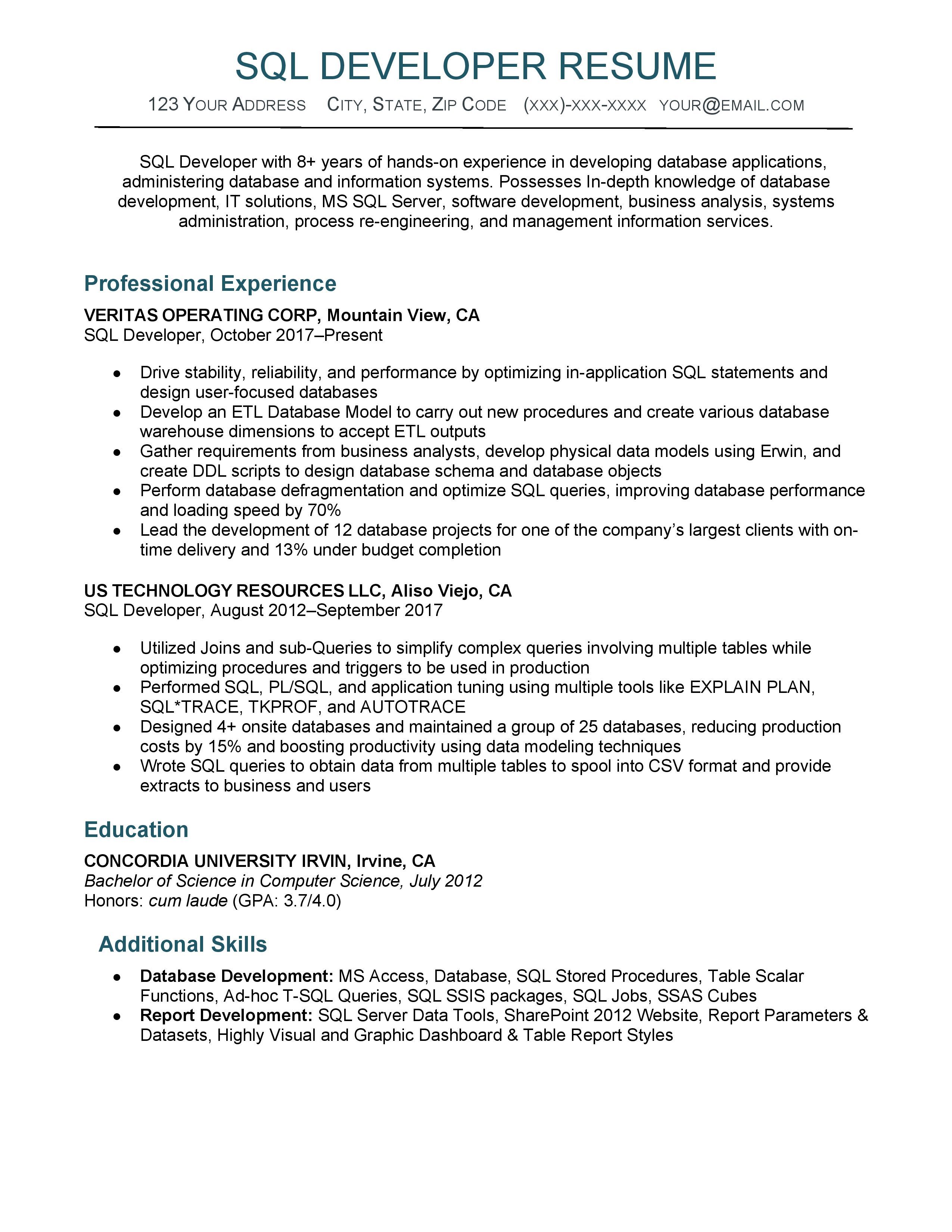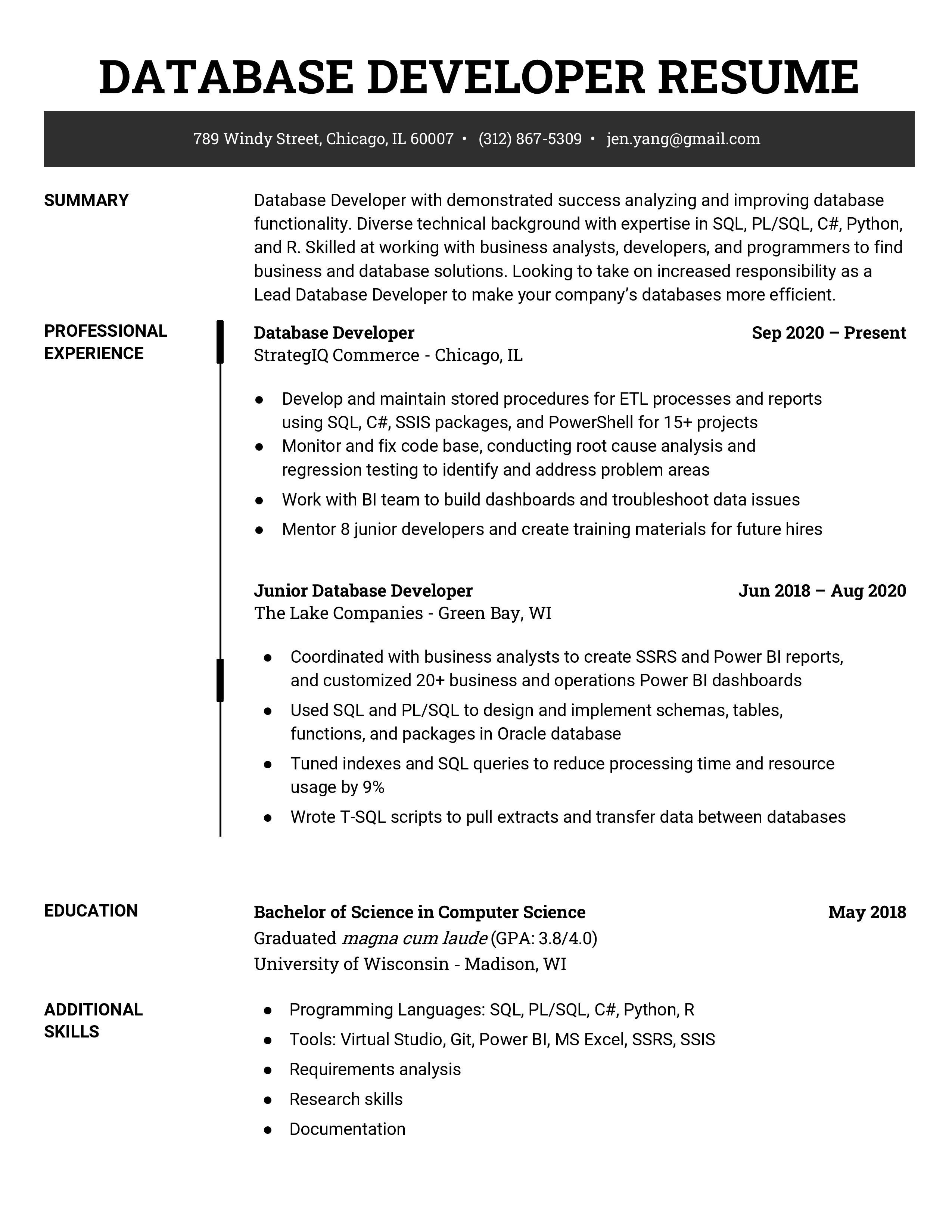SQL Developer Resume
Published on November 7th, 2024
The resume for a SQL developer should have experience in manipulating databases, SQL programming experience, data analysis, and complex query optimization. Such a candidate will be searching for a developer who has good expertise in designing and implementing the database system so it operates effectively with high dependability.
Check out the templates for SQL developer resumes.
Template 1
Template 2
Here is a step-by-step building of a compelling SQL developer resume emphasizing one's technical skills and ability to solve problems:
1. Write a Strong Professional Summary
The summary should present in brief your experience, technical expertise, and main achievements. Here is a sample:
"Experienced SQL Developer with 6+ years of experience designing, implementing, and optimizing complex database solutions. Highly skilled in SQL, PL/SQL, and database administration with a proven track record of improving database performance and ensuring data integrity. Ability to take business requirements and translate them into efficient database queries and reports that help inform business decisions."
In short, it showcases your technical capabilities along with the specific achievements that can be put on a single glance.
2. Core Technical Skills
In the skill section, ensure the highlighting of core skills including all aspects in which the individual has strong database programming ability along with other categories.
- SQL Programming: T-SQL, PL/SQL, complex joins, stored procedures, functions
- Database Management Systems: SQL Server, Oracle, MySQL, PostgreSQL
- Data Modeling: Normalization, Entity-Relationship (ER) diagrams, schema design
- Performance Tuning: Query optimization, indexing, troubleshooting
- ETL (Extract, Transform, Load): Data integration, transformation, SSIS, Talend
- Reporting and Analytics: Data analysis, BI tools (Tableau, Power BI)
- Scripting and Automation: Python, shell scripting, database task automation
- Version Control: Git, GitHub, SVN
- Problem Solving: Critical thinking, debugging, data integrity checks.
All these skills give a sharp picture of your technical strengths and daily working tools.
3. Professional Experience with Measurable Results
In the experience section, use bullet points to give details on your responsibilities and measurable results:
- "Developed and optimized more than 200 stored procedures and functions, enhancing the performance of queries by 30% and response time by a significant amount.
- Designed database schemas for a new financial application that has improved the efficiency of retrieving data by 40%.
- Collaborated with analytics teams in developing custom SQL queries to generate insights to support customer retention growth at 15%.
- Improved data integration for a project with a reduced time of 20% using SSIS in the ETL processes."
- Enhanced data integrity checks and automated weekly maintenance tasks that have decreased manual errors by 25%.
These are examples of your technical skills, in particular those showing how your work affected the performance of the database and the realization of the business objectives.
4. Education and Certifications
Outline all relevant education and any available certifications you can provide in support of your solid technical foundation and commitment to continued professional development.
- Education: Bachelor's Degree in Computer Science, Information Technology, or in a related field
- Certifications: Microsoft Certified: Azure Database Administrator Associate, Oracle PL/SQL Developer Certified Associate, AWS Certified Database Specialty, MySQL Database Administrator
5. Add a section called "Accomplishments" or "Projects"
You can use this section for notable project completions, awards earned for work accomplished, or even significant deliverables if that's important to communicate:
- Projects: Designed data warehousing for [Company] and built it 25% faster than similar projects.
- Recognition: Gained company-wide recognition in the optimization of SQL queries as well as improved database performance.
- Publications: Wrote methods for SQL optimization in a blog or technical journal.
This section will allow the reader to believe the applicant has a clue about what he or she is doing because he or she applies knowledge and can attain something in reality.
Some examples:
- Awarded "Employee of the Month" due to the successful implementation of a data warehousing project, which improved the rate of data retrieval by 25%.
- Designed a data integration system for the Client Project, improving data processing performance by 30%.
- Presented on SQL performance optimization at a regional tech conference and received good reviews.
6. A Clear and Organized Layout
Having an organized resume increases the chances of easy readability as well as giving it a professional look.
- Make use of bullet points while stating your responsibilities and accomplishments.
- Your resume should preferably not be more than two pages. Experience should be focused only when needed.
- Employ a professional font, such as Arial or Calibri, and keep your layout organized.
Conclusion
Ideally, a SQL Developer's resume should be explicit about technical know-how, practical experience, and success stories in database management and optimization. Thus, an SQL Developer resume is the best opportunity to develop one that attracts hiring managers through relevant skills, measurable achievements, and projects that exhibit an impact.
Authors

Soujanya Varada
As a technical content writer and social media strategist, Soujanya develops and manages strategies at HireQuotient. With strong technical background and years of experience in content management, she looks for opportunities to flourish in the digital space. Soujanya is also a dance fanatic and believes in spreading light!
Hire the best without stress
Ask us how
Never Miss The Updates
We cover all recruitment, talent analytics, L&D, DEI, pre-employment, candidate screening, and hiring tools. Join our force & subscribe now!
Stay On Top Of Everything In HR



